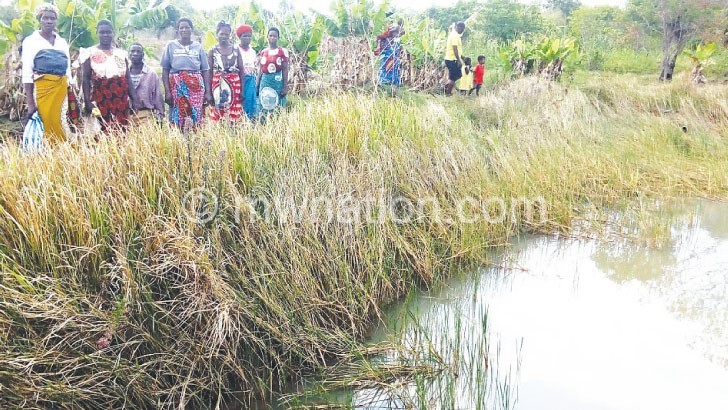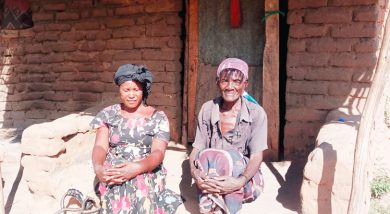When disability ain’t inability
They had nothing to do and nowhere to seek help. Everyone in society regarded them as unimportant, they say.
The mockery and hardship they were subjected to forced them to unite and form a group where they could discuss what to do for a living and prove to the world that disability is not inability.
Chimwemwe Disability Group in the Area of Traditional Authority Sawali in Balaka is an entity of persons with disabilities, comprising 21 members.

The group was formed on July 1 2003, chiefly to economically empower persons with disabilities. It also serves as a platform to discuss issues affecting them and how to channel their concerns to relevant authorities.
Soon after its formation, Chimwemwe Disability Group ventured into a simple business, but with huge benefits.
Led by their chairperson Charles Kamadunga, members agreed to embark on aquaculture and contributed money for hiring people to dig a fish pond.
“We asked our chief for a piece of land. We used the land to dig a fish pond.
“We bought fingerings and after six months, we made the first harvest,” he says.
Kamadunga adds that profit from the first harvest energised the group’s efforts. From then on, the group established several other fish ponds.
“Although the profit wasn’t much, but the returns helped us to support our families,” he says.
Today, the group has eight fish ponds and they are optimistic the venture will continue to uplift their families and empower them.
“Our group comprises people with different disabilities and where a person is too weak to work in the fish ponds, parents, guardians or any relative is asked to work on their behalf,” says Kamadunga.
“I am pleased to say that since we started sharing profits, every member has been able to buy one or more livestock, particularly goats.
“We agreed as a group that we needed to diversify sources of income and owning livestock came first,” he adds.
Livestock raised include goats and pigs. Other members rear chickens.
“This business has helped us a lot. We are now respected in the community because we are doing things that even people without disabilities are failing to do,” says Cecilia Majawa, a member.
Currently, villagers in Chinkwita and surrounding communities are depending on Chimwemwe Disability Group for fish protein.
Unlike other businesses that struggle for a market, the fish business in the area has a ready market.
“All the fish caught on a particular day is sold out locally and we don’t have to go to Balaka Town to fetch for market,” explains Kamadunga.
The group intends to increase the number of fish ponds and procure a solar water pump to provide water to the ponds in times of drought. The group has a savings account and if a member dies the group buys a standard coffin.
“Discrimination towards persons with disabilities has waned. We have broken barriers and people have now started to appreciate that persons with disabilities have the capabilities to do great things, given a chance,” says Josery Chiongolera, another member of the group.
At Ulongwe Trading Centre in Balaka is another group of people with disabilities, Tilitonse. It is famous for its maize farming business. Established in 2009, the group has 75 members.
In 2010, the group leased a farm where it harvested 10 bags of maize. The proceeds from the sale plus contributions from members were used to venture into multiple businesses, including piggery, goat and poultry farming and village loans and savings (VSL).
Currently, the group has 30 pigs, 100 goats and over K15 million in its VSL account. Today, the group is a model to many villages within Ulongwe and apart from feeding communities through maize sales, members are running various businesses.
“We are planning to buy minibuses and a maize mill, the idea is to diversify our business ventures and empower every family that has a person with a disability. Our quest is to prove that disability is not inability,” says Martha Hiwa, chairperson of Tilitonse Disability Group.
Malawi Council for the Handicapped (Macoha), which has been supporting the groups with technical assistance, is elated.
Macoha spokesperson Sylvia Thawani says it has always been the organisation’s wish to see the life of persons with disabilities changing through various interventions.
She says Macoha emphasises the importance of people at different levels to incorporate persons with disabilities.
“We are implementing the community based inclusive development [CBID] programme where we are calling on people to create space for persons with disabilities,” says Thawani.
She hails the two groups for their hard work, dedication and for showing the world that it is possible for persons with disabilities to succeed in life if supported.
“We have started training district councils where the focus is on that persons with disabilities must be included at all level—from planning, budgeting, auditing to implementation.
The United Nations Convention on the Rights of Persons with Disabilities protects the rights and dignity of persons with disabilities. It reaffirms that all persons with any type of disability must enjoy all human rights and fundamental freedoms.





